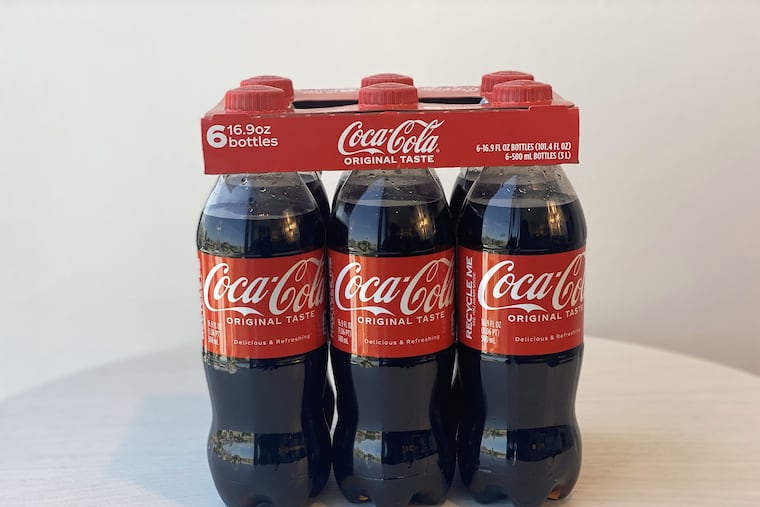Philly-area soda bottler is ditching plastic-ring carrier
Liberty Coca-Cola Beverages invested $3.5 million to transition to a recyclable paperboard carrier at its Philadelphia plant.

Packs of plastic soda bottles may soon look a little different on local grocery store shelves.
Liberty Coca-Cola Beverages, which has a soda production and distribution facility in Philadelphia and distributes beverages to Pennsylvania and neighboring states, is ditching the traditional plastic ring around plastic bottles for a recyclable paperboard carrier.
“Consumers are looking for more sustainable packaging. They’re looking for what’s good for the environment. They’re looking for innovation, things that are different, things that are a wow factor,” said Fran McGorry, CEO and co-owner of the bottler.
The switch is in line with efforts from some companies in the beverage industry to move away from plastic in recent years. In 2022, Coors Light announced it would stop using the plastic ring carrier in its North American brands, and Grupo Modelo, which has several beer brands, pledged a $4 million investment to move away from plastic packaging, according to the New York Times.
In early April, production at the Liberty Coca-Cola Beverages plant in Philadelphia stopped for about 20 days to install the new equipment necessary for the carriers, which took seven months to build in France, according to Michael Fein, the company’s senior director of procurement. The company spent $3.5 million to make the change, which includes the cost of equipment and installation, McGorry said.
Coca-Cola, Sprite, and Dr Pepper are some of the drinks customers in the Philadelphia region might see soon on store shelves with the new carrier. The new carrier is about 4 cents more expensive per six-pack than the old one, McGorry said, but the company won’t be passing on that cost to customers.
“Most of the sustainability is going to cost you more, but if you truly believe it’s the right thing to do, you don’t always look through a cost lens,” McGorry said.
Liberty Coca-Cola Beverages, which has plants in New Jersey, Pennsylvania, and New York, employs 3,200 workers, and about 600 work out of the Philadelphia facility. Unionized workers went on strike last year in Philadelphia over wage increases and retirement and health-care benefits. They ended the three-week strike after reaching an agreement on a five-year contract. No workers will be directly hired or laid off at the Philly facility as a result of the new carrier paperboard technology, McGorry said.
The company sells about 90 million cases of beverages a year to customers including supermarkets, drug stores, and convenience stores across Pennsylvania, New York, New Jersey, Connecticut, and Delaware. Of those cases, 70 million are produced by the company itself, and the rest arrive at the company’s facilities fully manufactured and ready to deliver to the customer.
The business began using a cardboard carrier for canned beverages at its New York facility two years ago. With this new carrier for plastic bottles, the bottler will no longer produce any products with plastic ring carriers, although it is still distributing products produced by other beverage companies that still have them.
By not using any plastic ring carriers, Liberty Coca-Cola Beverages is reducing its plastic use by 200,000 pounds a year, according to the company.
“The six-pack ring is sort of that classic image of litter in our oceans, our waterways,” said Faran Savitz, an advocate with PennEnvironment, a nonprofit advocacy organization. “Plastic breaks down into harmful microplastics which we’re finding in all sorts of frightening places.”
The paperboard used for the new carrier has no plastic film, and more than 75% of the fibers can be recovered through a standard recycling process, according to the company.
Having packaging that can be easily recycled is better than one that is either difficult or impossible to recycle, like a traditional six-pack ring, Savitz said. Still, there is more companies could be doing from an environmental standpoint, he said.
“The best option would be packaging that could be returned and reused or to reduce the packaging wholesale,” he said. “We want to reduce our waste first. We want to reuse what we can and then we turn to recycling.”